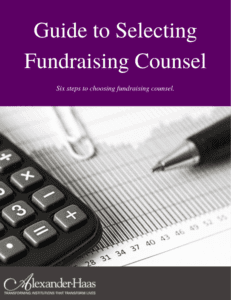Selecting fundraising counsel is a well-thought-out process that involves several stages. (3 Ways to Start Your Search for Fundraising Counsel, The Proven Approach to Requesting Proposals, Four Tips for an Effective Face-to-Face Meeting)
The final stage – notifying candidates of your decision – appears obvious. However, in their eagerness to begin work with the firm they’ve selected, some organizations fail to do a good job of notifying firms who were not selected.
It’s a given that you are excited to call the consulting firm you’ve selected to share the good news that you and your committee have made a decision to engage them. You feel confident about that firm’s ability to partner with you, your staff, your volunteers, your donors, and you’re ready to get started. That call is easy!
You may not be eager to contact the firm or firms that you and your committee didn’t select. After all, you’ve spent time talking with the other firms, sharing information about your organization and learning about them – especially about the consultants who would work most directly with your organization. In other words, you’ve developed a relationship and have some anxiety about disappointing the consultants you’ve not chosen. You’re also aware of the time spent in preparing a written proposal and other presentation materials as well as the resources of time and finances the firm’s representatives have expended to meet with you and your committee in person. (To learn more, check out Nancy Peterman’s blog – Fundraising Experts Share Their Top Tips for Choosing Outside Counsel.)
But, inevitably, you must deliver the news that they were not selected. The firms not selected will learn much from your feedback and it is likely you will engage them for other business in the future.
Here are ten tips to guide you through this process, easing your anxiety and aiding the firms you’re notifying:
- Deliver the news through a telephone call – not an email. The nonprofit sector is a relationship business. Talking to the consultant is far better than a form letter.
- Begin by thanking the consultant for taking the time and effort to engage in the process — the preliminary phone calls, drafting a proposal, meeting the committee members in person for a presentation, and providing any follow-up materials in response to questions during the presentation.
- Tell them that you and your committee selected another firm and then name the firm.
- Offer what you and your committee viewed as determining factors in the selection of the other firm. A different approach or process? Specific technical resources? Cost?
- Avoid general statements such as “We simply decided to go another direction…”
- Share a positive point that emphasizes what you and the committee saw as a strength of the non-selected firm.
- Provide some high-level constructive feedback such as “Ultimately, our committee was looking for X Y & Z and we believe that the firm selected will provide that.”
- Before you end the call, ask if there are any questions.
- Thank the consultant again for taking the time and effort to participate in your process.
- Leave the door open for some future consideration. For one reason or another, your organization may need to reach out to this firm later and it is important to maintain the relationship.
Fundraising consulting firms are businesses and understand many factors make up the decisions within your organization’s consultant selection process and they are used to wins and losses.
Just remember, they appreciate the courtesy of a call either way. It’s good stewardship!
Get our Guide to Selecting Fundraising Counsel
[/fusion_text][/fusion_builder_column][/fusion_builder_row][/fusion_builder_container]



